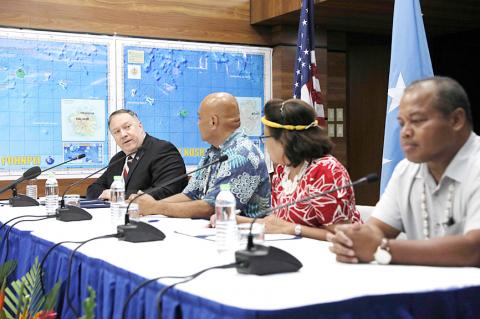Mike Pompeo yesterday became the first US secretary of state to visit Micronesia, as Washington has signaled a renewed interest in its Pacific allies, no matter how small, in the face of regional competition with China.
In the meantime, China has launched a regional charm offensive that has alarmed US President Donald Trump’s administration, offering infrastructure loans and seemingly trying to have the Marshall Islands and Palau break off diplomatic relations with Taiwan.
Pompeo touched down on the island of Pohnpei, where he was to spend a few hours meeting leaders from the Federated States of Micronesia, as well as neighboring nations such as Palau and the Marshall Islands.

Photo: AFP
The diplomatic courtship followed a visit by Pacific island leaders to the White House earlier this year, part of a US drive for a “free and open” Indo-Pacific region to counter China’s increasingly muscular and expansionist policies.
“It’s still a major strategic area, and this isn’t new,” a senior State Department official said, citing past ties. “Now, the level of interaction is clearly elevated.”
Over the past year, the US has “worked aggressively” to shore up its position in the Pacific region, considering it “of significant strategic interest,” Elizabeth Economy of the Council on Foreign Relations said.
Hugging the equator, the Federated States of Micronesia are scattered along nearly 3,000km of the Pacific, a significant area given Sino-American disputes over freedom of navigation in ocean waterways.
Washington is no stranger to Micronesia — which brings together four island states and more than 600 islands and atolls — thanks to a compact that guarantees US development aid and military protection.
Formerly part of the Caroline Islands, which were US trust territories, the federation signed a Compact of Free Association with the US after gaining independence more than three decades ago.
Those agreements are set to be renewed in the coming years.
“The US can no longer afford to take the Pacific islands for granted,” Economy said.
The nations’ major point of difference with the US remains climate change — an existential challenge for low-lying nations, but a trend that the Trump administration has variously dismissed as a hoax or unimportant.

‘THEY KILLED HOPE’: Four presidential candidates were killed in the 1980s and 1990s, and Miguel Uribe’s mother died during a police raid to free her from Pablo Escobar Colombian presidential candidate Miguel Uribe has died two months after being shot at a campaign rally, his family said on Monday, as the attack rekindled fears of a return to the nation’s violent past. The 39-year-old conservative senator, a grandson of former Colombian president Julio Cesar Turbay (1978-1982), was shot in the head and leg on June 7 at a rally in the capital, Bogota, by a suspected 15-year-old hitman. Despite signs of progress in the past few weeks, his doctors on Saturday announced he had a new brain hemorrhage. “To break up a family is the most horrific act of violence that

HISTORIC: After the arrest of Kim Keon-hee on financial and political funding charges, the country has for the first time a former president and former first lady behind bars South Korean prosecutors yesterday raided the headquarters of the former party of jailed former South Korean president Yoon Suk-yeol to gather evidence in an election meddling case against his wife, a day after she was arrested on corruption and other charges. Former first lady Kim Keon-hee was arrested late on Tuesday on a range of charges including stock manipulation and corruption, prosecutors said. Her arrest came hours after the Seoul Central District Court reviewed prosecutors’ request for an arrest warrant against the 52-year-old. The court granted the warrant, citing the risk of tampering with evidence, after prosecutors submitted an 848-page opinion laying out

STAGNATION: Once a bastion of leftist politics, the Aymara stronghold of El Alto is showing signs of shifting right ahead of the presidential election A giant cruise ship dominates the skyline in the city of El Alto in landlocked Bolivia, a symbol of the transformation of an indigenous bastion keenly fought over in tomorrow’s presidential election. The “Titanic,” as the tallest building in the city is known, serves as the latest in a collection of uber-flamboyant neo-Andean “cholets” — a mix of chalet and “chola” or Indigenous woman — built by Bolivia’s Aymara bourgeoisie over the past two decades. Victor Choque Flores, a self-made 46-year-old businessman, forked out millions of US dollars for his “ship in a sea of bricks,” as he calls his futuristic 12-story

FORUM: The Solomon Islands’ move to bar Taiwan, the US and others from the Pacific Islands Forum has sparked criticism that Beijing’s influence was behind the decision Tuvaluan Prime Minister Feletei Teo said his country might pull out of the region’s top political meeting next month, after host nation Solomon Islands moved to block all external partners — including China, the US and Taiwan — from attending. The Pacific Islands Forum (PIF) leaders’ meeting is to be held in Honiara in September. On Thursday last week, Solomon Islands Prime Minister Jeremiah Manele told parliament that no dialogue partners would be invited to the annual gathering. Countries outside the Pacific, known as “dialogue partners,” have attended the forum since 1989, to work with Pacific leaders and contribute to discussions around